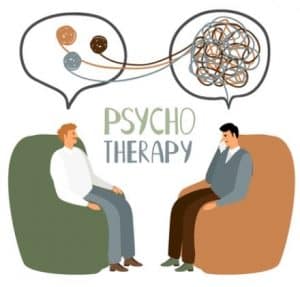Share This Article
Understanding Gymnophobia and the Fear of Nudity
Wondering why you relate so well with Tobias Funke and his crippling fear of nudity in Arrested Development ? Chances are, you’ve got gymnophobia, aka fear of nudity. Yes, it’s a real phobia. This fear goes beyond the apprehension of undressing in front of others or discomfort with gym class showers. It’s a legitimate fear of the naked body.
It may seem strange to be afraid of your own (or someone else’s) naked body. The crippling fear of being seen naked or witnessing someone who isn’t wearing clothes may leave you sweating or hyperventilating.
What’s unfortunate is that this fear can cause anxiety surrounding essential activities such as showering or sexual experiences. Being afraid of nudity is real and the source of this fear needs to be identified before you can overcome it.
How common is gymnophobia? Read on to learn more about fear of nudity.

Why Would You Get Gymnophobia?
You’re probably wondering what causes gymnophobia. There’s a difference between disliking unprompted nudity and dreading it all together.
If you think you have gymnophobia, try and do a quick root-cause analysis. Could it be because of your negative feelings about your body? Do you perhaps think your body doesn’t measure up to the airbrushed figures you see in the media? Or is it because you feel self-conscious about marks or scars on your body?
On the other hand, your gymnophobia may involve a fear of vulnerability when being naked around someone else. This is often the case with survivors of sexual trauma who may perceive nudity as a trigger.
Those experiencing gender dysphoria may also be prone to gymnophobia as they may not feel at home in their bodies.
Symptoms of Gymnophobia
All phobias are on a spectrum and the intensity varies depending on the person as well as the situation. This could mean feeling panic when walking in on a naked family member after your morning jog, or feeling anxious about taking a bath on your own. Where you fall on the spectrum will depend on different variables.
Here’s a list of common gymnophobia symptoms.
Physical Symptoms
- Sweating
- Nausea
- Vomiting
- Shortness of breath
- Irregular breathing
- Dizziness
- Stiff muscles
Mental/Emotional Symptoms
- Anxiety
- Paranoia
- Panic attacks
- Shame
- Difficulty concentrating
- Mood swings
- Withdrawing from others
You may experience one, several, or all of these symptoms if you have gymnophobia. It could even combine with other fears and cause more complex phobias. For instance, fear of sex could merge with fear of nudity and wreak havoc on one’s mental health.
As a result, intimate relationships can feel strained, and the individual may experience incompetence which can lead to depression. Gymnophobia can become debilitating if left untreated for a long period of time. The condition requires early intervention and prompt treatment.
How to Treat Gymnophobia
The good news is that it is possible to overcome gymnophobia. Depending on the intensity of your fear, you can take concrete steps on your own and/or seek professional help to manage it.
It’s crucial to remember that your gymnophobia may be purely incidental or a result of trauma. Either way, there are readily available tools to help manage it so you can lead a full life.
Self-Help Methods for Comfort
Mild to moderate gymnophobia can be easily managed on your own, provided you make a few adjustments to your daily routine.
Avoid places that require nudity, including showers at your gym or changing rooms in clothing stores. For those who fear seeing yourself or others naked, this is a great start.
If you feel self-conscious about being naked with your partner, keep the lights low or off during times of intimacy. This is helpful for shy people, and for those who are triggered by self/others’ nudity.
Wear underwear in the shower, so you don’t have to witness yourself completely naked. You can quickly change into a towel once you’re done bathing.
Professional Options Available to Treat Gymnophobia
By seeking help from licensed medical professionals, you can treat gymnophobia. Your therapist can listen to your concerns in a non-judgemental, safe space and work with you to discover the root cause of your fear.
Once you’ve established a baseline, your therapist can then recommend treatment that fits the intensity of your phobia. You can begin to recognize patterns that trigger you and work on slowly changing them. Moreover, therapy will help you understand yourself better so that you can make informed choices that will help you feel safe.
Below are some professional options available for gymnophobia treatment.
Cognitive Behavioral Therapy (CBT)
This therapy is based on the concept that our behaviors are influenced by our thought processes and how we perceive the world around us. Certain events from our life (especially childhood) can alter our view of the world. This usually happens without our knowledge and goes unnoticed.
With the help of CBT, your thought process and understanding of reality are analyzed. If it isn’t an accurate depiction (of yourself or the world around you) and is harming you, CBT employs methods and strategies to challenge and overcome this misaligned thought process.
In this case, your perception of nudity will be analyzed to verify the source of your fear and anxiety. This source is then scrutinized (with care) and your thought process is realigned slowly to invoke a more healthy view of nudity.

Hypnotherapy
If you are unable to trace the source of your gymnophobia, you may want to try clinical hypnotherapy conducted by a qualified medical professional. Through hypnotherapy, your mind is explored and the root cause of your fear is identified.
Hypnoanalysis is a combination of hypnotherapy and psychoanalysis, which is one of the most effective methods to deal with phobias. It can be used to deal with gymnophobia as well.
Medication
Never take medication of any kind without a prescription from a doctor. While there aren’t specific medications that can cure your gymnophobia, there are medicines that can soothe and treat your anxiety and depression and improve your quality of life.
Typically, there are three kinds of medications used to treat anxiety. These include:
- Antidepressants
- Beta-blockers
- Tranquilizers
Learning to Cope with Gymnophobia
The concept of “good naked” and “bad naked” has become a staple in mainstream society. This isn’t just a sketch from Seinfeld, but a fundamental concept that has been around for eons.
Challenging the norms of morality around the human body could be a good start. To elaborate, it’s important to view nudity as normal and clothes as the convenience they were intended to be. This will help you unlearn your understanding of nudity. Nudity is a personal choice, but it should not have feelings of shame and guilt attached to it.
To cope with this fear, you may want to try techniques such as exposure and rewards. For instance, every time you successfully take a shower or use a changing room, reward yourself with a small treat as positive reinforcement. You can also try watching your favorite actors remove their shirts on TV, and allow yourself to view nudity positively.
By learning how to cope with gymnophobia, you can successfully take the first step toward improving your quality of life. Simply put, seeking help will put you one step closer to effectively managing your fear. When you’re ready, you can even push your boundaries by visiting naturist spaces and interacting with pro-nudists as well. We’re not saying that should be the first step—but it could be the end goal.



